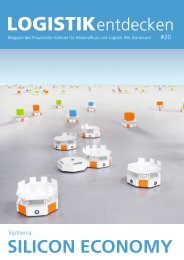Fraunhofer IML Jahresbericht 2019
Wer die Logistikketten der Welt steuert, der steuert die Wirtschaft der Welt. Dieser Leitgedanke hat das Logistikjahr 2019 geprägt. 2019 war ein Meilenstein auf dem Weg in die Silicon Economy – das Jahr, in dem sich bis in die höchsten Kreise von Politik und Wirtschaft die Erkenntnis durchgesetzt hat, dass die Zukunft Deutschlands ganz wesentlich in einer logistischen Plattformökonomie liegt. Einblicke gibt’s im neuen Jahresbericht!
Wer die Logistikketten der Welt steuert, der steuert die Wirtschaft der Welt. Dieser Leitgedanke hat das Logistikjahr 2019 geprägt. 2019 war ein Meilenstein auf dem Weg in die Silicon Economy – das Jahr, in dem sich bis in die höchsten Kreise von Politik und Wirtschaft die Erkenntnis durchgesetzt hat, dass die Zukunft Deutschlands ganz wesentlich in einer logistischen Plattformökonomie liegt. Einblicke gibt’s im neuen Jahresbericht!
Sie wollen auch ein ePaper? Erhöhen Sie die Reichweite Ihrer Titel.
YUMPU macht aus Druck-PDFs automatisch weboptimierte ePaper, die Google liebt.
PREFACE
Whoever controls the logistics chains of the world controls
the world’s economy. This guiding principle has shaped the
logistics year of 2019. 2019 was a milestone on the way to the
Silicon Economy – the year when it was realized all the way up
to the highest levels of the political and business community
that the future of Germany lies essentially in a logistics platform
economy.
This was impressively underscored by the Digital Summit at
the end of October in Dortmund. Numerous members of
the federal government, above all Chancellor Angela Merkel,
visited the Westfalenhallen in Dortmund to learn about the
role that logistics will play in the coming Silicon Economy –
including Federal Research Minister Anja Karliczek, Federal
Minister of Labor Hubertus Heil and Federal Transport Minister
Andreas Scheuer.
necessary. Thanks to artificial intelligence, it drives quickly and
autonomously, negotiates and organizes its orders and networks
via 5G and International Data Spaces. This makes the
vehicle the ideal example for the autonomization and vertical
networking of a digital platform economy.
The industrialization of artificial intelligence is the key to the
Silicon Economy. This is why we are pleased to be at the
forefront of basic research by opening the Rhine-Ruhr Competence
Center for Machine Learning (ML2R). ML2R bundles
the competencies of four pioneering institutions for machine
learning: Technical University of Dortmund, Fraunhofer Institute
for Intelligent Analysis and Information Systems IAIS
in Sankt Augustin, University of Bonn and Fraunhofer IML.
Because cutting-edge research requires working together –
just like in the Silicon Economy, where everything will be networked
with everything else in open, federal structures.
At the Federal Ministry for Transport and Digital Infrastructure,
we also had the opportunity to present the Silicon Economy
as a key element in the “Innovation Program Logistics 2030”,
which was presented by Minister Scheuer in September 2019.
In addition, we were already able to present a technology in
2019 that has become part the Silicon Economy in its DNA:
the “LoadRunner ® ”, which celebrated its world premiere in
front of representatives from the political and media community
at the Digital Summit and even made it into the
mainstream evening news on German television. We are particularly
proud of the results of this mammoth project involving
multiple areas and completed in only six months by our
Fraunhofer IML. The “LoadRunner ® ” is an autonomous highspeed
vehicle that is able to organize itself in a highly dynamic
manner by moving up to 10 m/s in a chaotic environment and
even attach itself to another vehicle for transport jobs, if
Let’s work together on the Silicon Economy and thus on our
future! I hope you enjoy reading this and many other highlights
of our work in the 2019 Annual Report. I would like
to thank all our customers, partners and especially our colleagues
at Fraunhofer IML, who spent around 690,000 hours
conducting logistics research in 2019.
On behalf of Institute Management
Prof. Dr. Dr. h. c. Michael ten Hompel
Executive director
7





